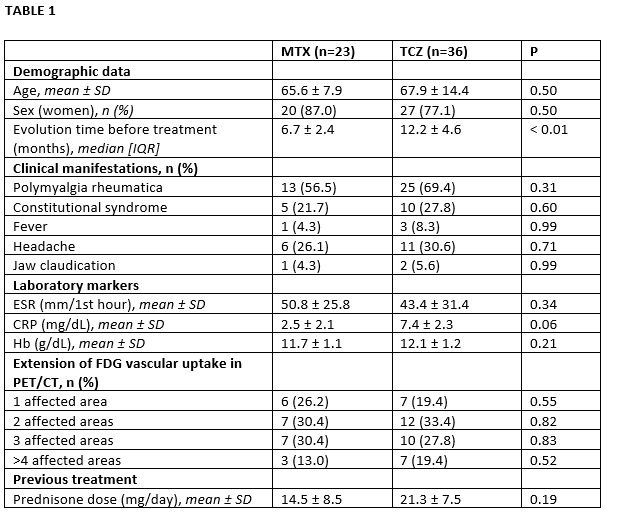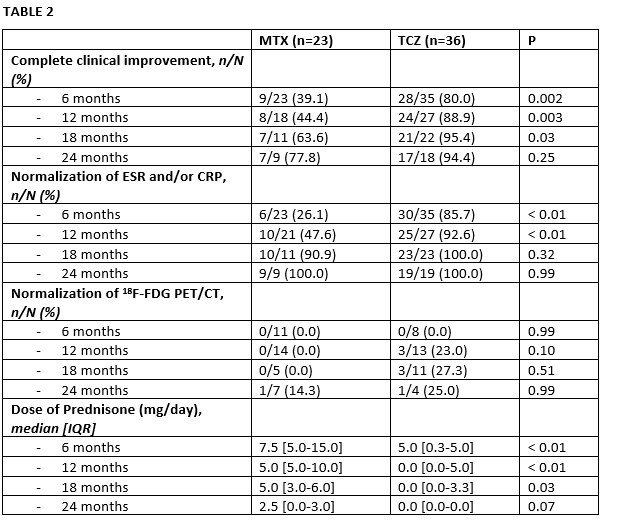Session Information
Date: Tuesday, November 12, 2019
Title: Vasculitis – Non-ANCA-Associated & Related Disorders Poster III: Giant Cell Arteritis
Session Type: Poster Session (Tuesday)
Session Time: 9:00AM-11:00AM
Background/Purpose: Giant cell arteritis (GCA) is the most common large vasculitis in elderly patients. According to previous studies, 50% of patients with GCA in whom PET/CT was performed showed large vessel involvement (LV-GCA). In these patients there is a higher risk of vascular complications. Thus, an early and adequate therapy is needed. Glucorcorticoids (GC) remain to be the cornerstone of GCA. However, relapses are common when the prednisone dose is tapered. Thus, additional therapies are required. In this regard, methotrexate (MTX) is commonly used. However, its efficacy is modest and, in some patients, biological therapy is required. Tocilizumab (TCZ) has demonstrated to be effective.
Our aim was to compare clinical evolution, normalization of acute phase reactants and normalization of vascular 18F-FDG uptake assessed by PET/CT in patients with GCA treated with MTX vs TCZ in clinical practice.
Methods: Comparative multicentric study of 23 patients with GCA treated with MTX compared with 36 patients with refractory GCA to MTX treated with TCZ who had a baseline and follow-up PET/CT scan. We assessed clinical improvement (no improvement/partial/complete), normalization of acute phase reactants (CRP ≤ 0.5mg/dL and/or ESR ≤ 20 mm/1st hour) and reduction of 18F-FDG uptake in PET/CT (no reduction/partial/complete normalization). Images were evaluated qualitatively by experienced nuclear medicine physicians. Prednisone tapering was also assessed. Statistical analysis was performed with SPSS. Student´s t test or Mann-Whitney U test was used to compare continuous variables, and Chi-squared test or Fisher´s exact test for categorical variables as appropriate.
Results: We included 23 patients with GCA treated with MTX (20 women/3 men); mean age 65.6 ± 7.9 years; and 36 patients treated with TCZ (27 women/9 men); mean age 67.5 ± 8.3 years. Baseline characteristics were similar in both groups (TABLE 1). All patients with MTX received doses ranging between 20 and 25 mg/week as subcutaneous injections. Most of patients with TCZ received treatment as intravenous infusions (80.6%) and almost half of them (52.7%) received combined therapy with MTX. Clinical, analytical, 18F-FDG vascular uptake evolution and prednisone tapering is shown in the TABLE 2. After one year of treatment, the percentage of patients who experienced complete clinical improvement (88.9% vs 44.4%; p=0.003) and normalization of acute phase reactants (92.6% vs 47.6%; p=0.001) was higher in patients who received TCZ. No differences were found between patients who received TCZ monotherapy and those who received combined therapy. In regard with reduction of 18F-FDG vascular uptake, complete normalization was only achieved in 25% of patients who received TCZ and 14.3% of those who received MTX at 24 months. A higher cumulative incidence of infections was found in patients who received TCZ (7.4 vs 4.3 infections/100 patients/year).
Conclusion: Patients with GCA who received TCZ experienced a more rapid and effective clinical and analytical improvement than patients who received MTX. Besides, prednisone tapering was quicker in patients with TCZ. However, complete normalization of vascular 18F-FDG uptake was only observed in around 20% of patients in both groups.
To cite this abstract in AMA style:
PRIETO- PENA D, Calderón-Goercke M, Loricera J, Narváez J, Aurrecoechea E, Villa I, Castañeda S, Gómez-Arango C, Mera A, Perez Pampín E, Aldasoro Caceres V, Alvarez Rivas N, Fernandez Llanio N, Álvarez del buergo M, Marena-Rojas L, Sivera F, Galindez-Agirregoikoa E, Solans-Laqué R, Romero-Yuste S, Sanchez-Bilbao L, Gonzalez-Mazon I, Martínez Rodríguez I, Banzo I, González-Gay M, Blanco R. Real-world Comparative Study of Methotrexate vs Tocilizumab in Patients with Giant Cell Arteritis with Large Vessel Involvement [abstract]. Arthritis Rheumatol. 2019; 71 (suppl 10). https://acrabstracts.org/abstract/real-world-comparative-study-of-methotrexate-vs-tocilizumab-in-patients-with-giant-cell-arteritis-with-large-vessel-involvement/. Accessed .« Back to 2019 ACR/ARP Annual Meeting
ACR Meeting Abstracts - https://acrabstracts.org/abstract/real-world-comparative-study-of-methotrexate-vs-tocilizumab-in-patients-with-giant-cell-arteritis-with-large-vessel-involvement/


